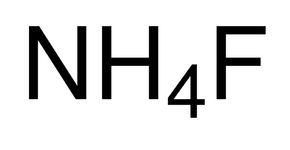Ammonium Fluoride
Ammonium Fluoride Solution (17062)
40%, ULSI Puranal
General Information
- Grade
- ULSI
- Molar Mass
- 37.04 g/mol
- Synonyms
- Ammonium fluorure
Physical Properties
- Boiling Point/Range
- > 100 °C (1,013 hPa)
- Color
- Colorless
- Density
- 1.110 g/cm3 (20 °C)
- Flashpoint
- Not applicable
- Melting Point/Range
- No data available
- Odor
- Odorless
- Partition Coefficient
- No data available
- pH
- 6.2 to 7.0 (20 °C)
- Physical Form
- Liquid
- Solubility in Water
- Completely miscible
- Vapor Pressure
- similar to water hectopascal
Safety Information
- Chemical Stability
- Stable under normal conditions.
- Evaporation Rate
- No data available
- Flammability
- Not applicable
- Flammable Gas Formation
- The substance or mixture does not emit flammable gases in contact with water.
- Ignition Temperature
- Not applicable
- Incompatible Materials
- Contact with strong acids liberates hydrogen fluoride, Glass and silicate-containing materials are attacked
- Oxidizing
- The substance or mixture is not classified as oxidizing.
- Self Ignition
- Not auto-flammable
- Thermal Decomposition
- No decomposition if used as directed.
International Transportation
- Chemical Class
- 6.1
- Harmonized System Code
- 28261910
- Packing Group
- III
- UN Number
- 3287
General Information
- Grade
- ULSI
- Molar Mass
- 37.04 g/mol
- Synonyms
- Ammonium fluorure
Physical Properties
- Boiling Point/Range
- > 100 °C (1,013 hPa)
- Color
- Colorless
- Density
- 1.110 g/cm3 (20 °C)
- Flashpoint
- Not applicable
- Melting Point/Range
- No data available
- Odor
- Odorless
- Partition Coefficient
- No data available
- pH
- 6.2 to 7.0 (20 °C)
- Physical Form
- Liquid
- Solubility in Water
- Completely miscible
- Vapor Pressure
- similar to water hectopascal
Safety Information
- Chemical Stability
- Stable under normal conditions.
- Evaporation Rate
- No data available
- Flammability
- Not applicable
- Flammable Gas Formation
- The substance or mixture does not emit flammable gases in contact with water.
- Ignition Temperature
- Not applicable
- Incompatible Materials
- Contact with strong acids liberates hydrogen fluoride, Glass and silicate-containing materials are attacked
- Oxidizing
- The substance or mixture is not classified as oxidizing.
- Self Ignition
- Not auto-flammable
- Thermal Decomposition
- No decomposition if used as directed.
International Transportation
- Chemical Class
- 6.1
- Harmonized System Code
- 28261910
- Packing Group
- III
- UN Number
- 3287
- Grade : ULSI
- Synonyms : Ammonium fluorure
- Molar Mass : 37.04 g/mol
- Solubility in Water : Completely miscible
- Melting Point/Range : No data available
- pH : 6.2 to 7.0 (20 °C)
- Physical Form : Liquid
- Density : 1.110 g/cm3 (20 °C)
- Boiling Point/Range : > 100 °C (1,013 hPa)
- Partition Coefficient : No data available
- Flashpoint : Not applicable
- Odor : Odorless
- Color : Colorless
- Vapor Pressure : similar to water hectopascal
- Flammability : Not applicable
- Incompatible Materials : Contact with strong acids liberates hydrogen fluoride, Glass and silicate-containing materials are attacked
- Flammable Gas Formation : The substance or mixture does not emit flammable gases in contact with water.
- Self Ignition : Not auto-flammable
- Evaporation Rate : No data available
- Thermal Decomposition : No decomposition if used as directed.
- Ignition Temperature : Not applicable
- Chemical Stability : Stable under normal conditions.
- Oxidizing : The substance or mixture is not classified as oxidizing.
- Chemical Class : 6.1
- UN Number : 3287
- Packing Group : III
- Harmonized System Code : 28261910





